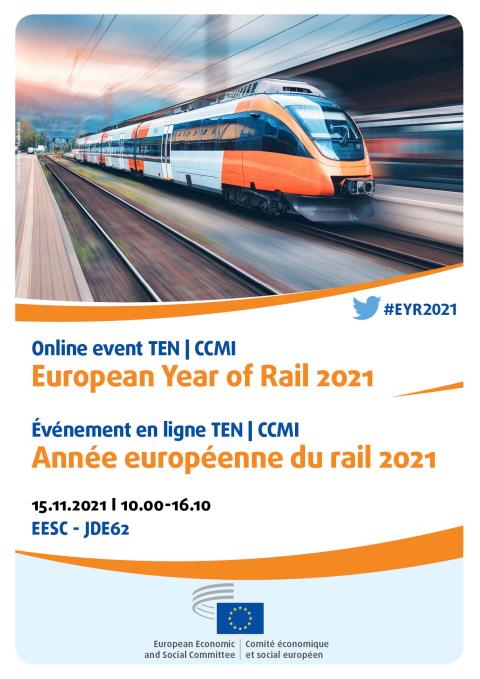European Economic
and Social Committee
European Year of Rail 2021
The event was webstreamed with interpretation into EN, FR and DE. Viewers had the opportunity to engage in the debate using the platform Slido, with the code #EYR2021.
The event, co-organised by the Section for Transport, Energy, Infrastructure and the Information Society (TEN) and the Consultative Commission on Industrial Change (CCMI), opened by Christa Schweng, EESC president, and attended by Elżbieta Łukaniuk, member of Commissioner Vălean's Cabinet, brought together high-level speakers from European civil society organisations and European and national institutions, including Barbara Thaler, MEP, TRAN committee, EPP shadow on the European Year of Rail, and Tālis Linkaits, Latvian Minister for Transport.
After the opening remarks, two workshops took place on:
- the decarbonisation and digitalisation of railways; and
- the role of railways in the TEN-T corridors and in the completion of the core TEN-T network.
These workshops provided an opportunity to focus on topics such as interconnections, interoperability, TEN-T, the digitalisation of rail and its crucial contribution to reducing emissions in the transport sector.
The European Year of Rail 2021 was launched by the Portuguese EU presidency at the kick-off event on 29 March. In connection with the European Year of Rail, the Portuguese EU presidency asked the EESC for an exploratory opinion on The Single European Railway area, which was adopted on 24 March and was presented at the Council Working Party on Land Transport on 16 April. The European Year of Rail is a unique opportunity for organised civil society to debate the benefits of rail for travellers and users, in terms of working conditions, the economy and the climate, as well as the challenges facing the creation of a true single European rail transport space without borders.
It is not by chance that 2021 is the European Year of Rail. It was the natural choice following the launch of the European Green Deal. The European Commission is promoting an ambitious programme under the European Green Deal aiming to make Europe the first climate-neutral continent by 2050. It provides a roadmap for making the EU's economy sustainable by turning climate and environmental challenges into opportunities across all policy areas and making the transition just and inclusive for all. Today, transport emissions represent around a quarter of the EU's total greenhouse gas emissions. To achieve the climate neutrality envisaged in the European Green Deal, the EU transport sector has to cut its CO2 emissions by 90% by 2050 (55% by 2030). Railways can play a major role in achieving these targets.
